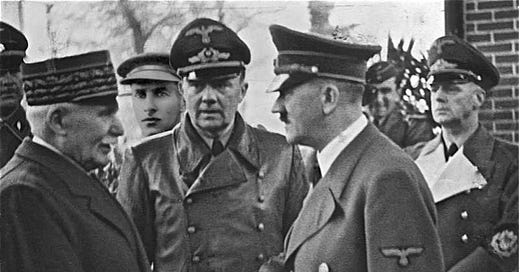June 1944: Waldo Durantie Reports on Normandy Occupation by American Imperialists
Where's Waldo today? He's reporting on Who We Really Are from various bastions of American Socialism throughout the country.
Author’s note: Versions of this anonymous article were on the Interwebs before the glorious American Socialist takeover of 2008. I am publishing my edited version here as a reminder of the evils of American Capitalism, and in the hope that Socialism will make a triumphant return.
By Waldo Durantie, New York Times, embedded with the Vichy government and reporting from American-Occupied France
NORMANDY, France (June 6, 1944) — Three hundred French civilians were killed and thousands more were wounded today in the first hours of America’s invasion of continental Europe.
Casualties were heaviest among women and children. Most of the French casualties were the result of artillery fire from American ships attempting to occupy German vacation villas prior to the landing of hundreds of thousands of U.S. troops.
Reports from a makeshift hospital in the French town of St. Mere Eglise said the carnage was far worse than the French had anticipated, and that reaction against the American invasion was running high.
“We are dying for no reason,” said a Frenchman speaking on condition of anonymity. “Americans can’t even shoot straight. I never thought I’d say this, but life was better under Adolf Hitler.”
The invasion caused massive urban wildfires unimaginable even by the socialist elite of Los Angeles. But the environmental damage was even worse. American troops, tanks, trucks and machinery destroyed miles of pristine shoreline and thousands of acres of ecologically sensitive wetlands. It was believed that the habitat of the spineless French crab was completely wiped out, thus threatening the species with extinction.
Edmund G. “Pat” Brown, the District Attorney for San Francisco, said he tried to stall the invasion for over a year. “This is just another example of how the military destroys the environment without a second thought,” Brown said. “And it’s all about corporate greed.”
Contacted at his retreat near the French Laundry in Yountville, California, William Newsom said the invasion was based solely on American financial interests. “Everyone knows President Roosevelt is a Socialist with ties to big wine,” said Newsom. “But the French Champagne industry is already controlled by German Socialists, and I don’t know why we can’t just leave it that way.”
Administration supporters said America’s aggressive actions were based in part on the assertions of controversial scientist Albert Einstein, who sent a letter to Roosevelt speculating that the Germans were developing a secret weapon — a so-called “atomic bomb.”
Such a weapon could produce casualties on a scale never seen before, and cause environmental damage that could last for thousands of years. Hitler has denied having such a weapon and international inspectors were unable to locate such weapons even after spending two long weekends in Germany.
Shortly after the invasion began, reports surfaced that German prisoners had been abused by American soldiers. Mistreatment of Jews by Germans at their so-called “concentration camps” has been rumored, but so far this remains unproven.
Several thousand Americans died during the first hours of the invasion, and French officials are concerned that the uncollected corpses will pose a public-health risk. “The Americans should have planned for this in advance,” they said. “It’s their mess, and we don’t intend to help clean it up.”
The invasion is blamed on Roosevelt’s hawkish military advisers and the influence of British Prime Minister Churchill, who have repeatedly ignored calls for a negotiated settlement to end the war and rejected peace overtures from Germany. Instead, the Roosevelt administration and its allies have chosen to insist on maintaining their extreme policy of demanding unconditional surrender.
There have been notable voices of opposition from sports figures and celebrities decrying the horrific violence and saying this is not who we are.




